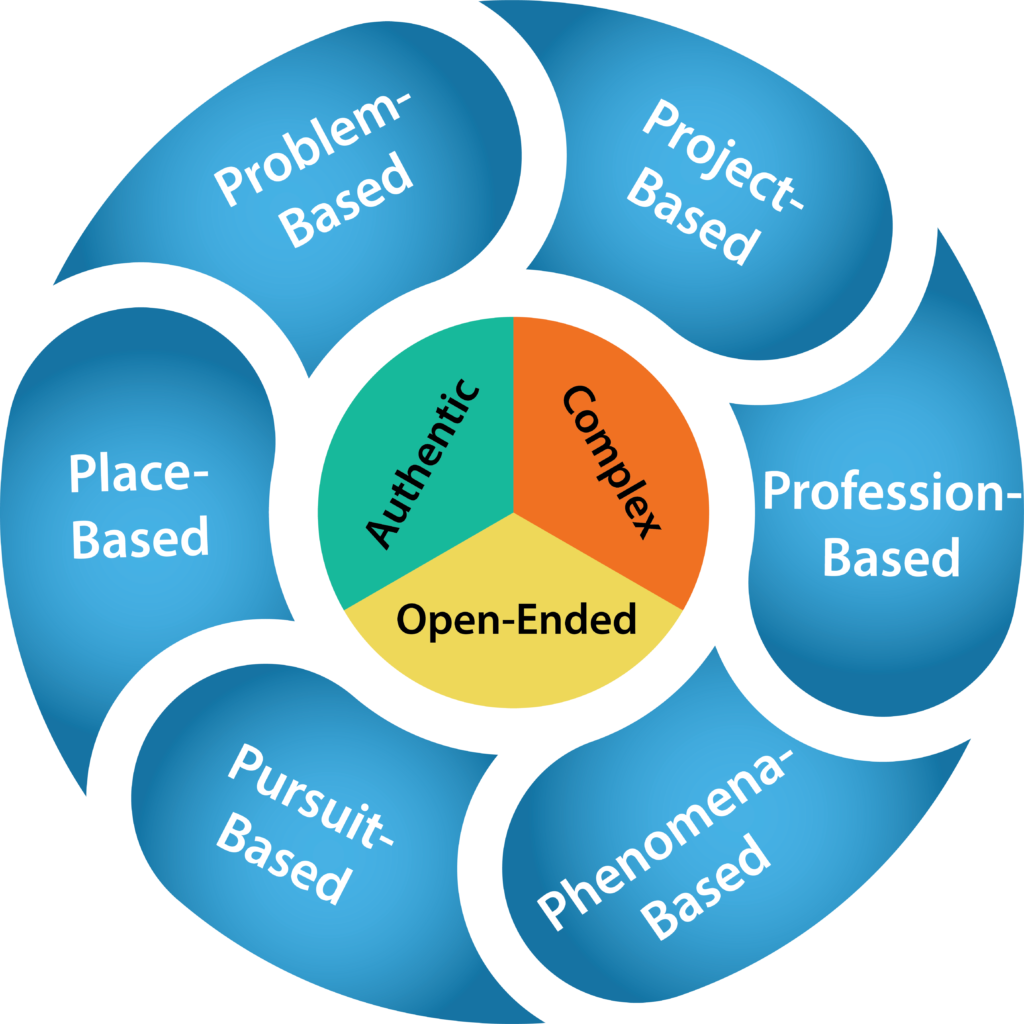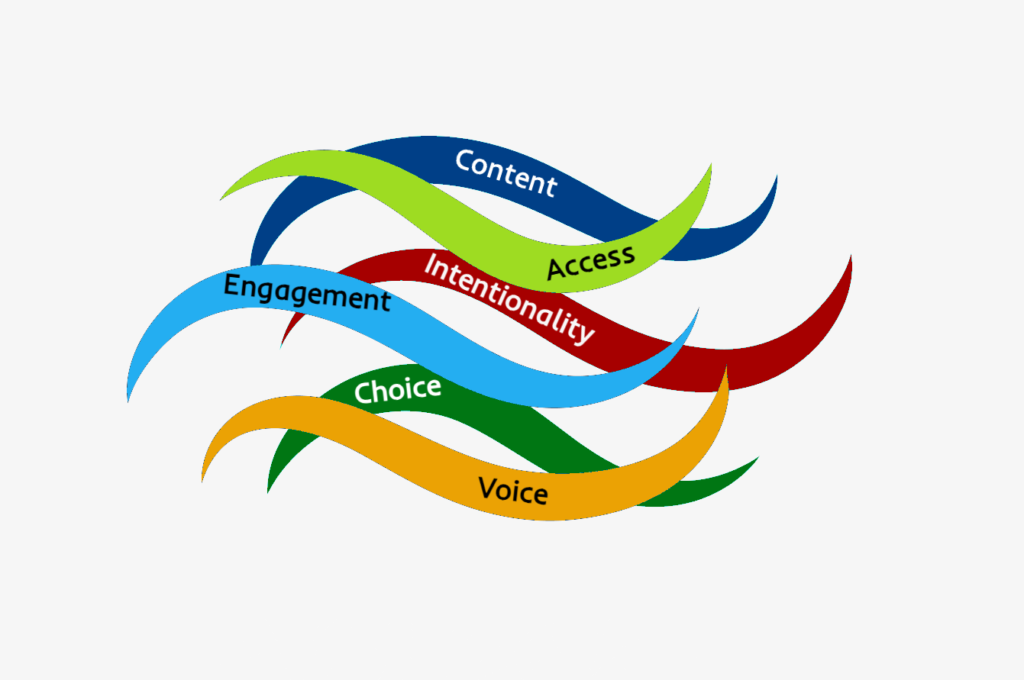Virtual Learning Communities
What if you could bring back more than just good intentions from professional learning experiences?
Our Virtual Learning Communities are different than most online courses in that each VLC has a facilitator who guides the course, provides valuable feedback, and fosters a community of learners. At EdQuiddity, we believe professional learning should:
- Model innovative practices
- Provide new learning
- Have participants design materials to use in school immediately
We now offer an option beyond our in-person professional learning! Online engagement, 25 hours of self-paced engagement, in addition to continual feedback and assistance, and video conference sessions. Work at times convenient for you and have fun challenging your pedagogical thinking.
Only $595 per seat or $4,950 for a 10-pack of seats.
Click the images below for course descriptions.

Design PBLs













Available VLC Schedule
Executive function is critical to students’ academic achievement and social-emotional learning. Focusing, shifting attention from one activity to another, working toward a goal, persisting in a task, catching and correcting errors, and managing time are all executive function skills that students need to be successful in any learning environment. The sudden shift to remote learning during the pandemic transformed education. Executive function skills often determined student resilience and success. The good news is that executive function skills can be developed and accelerated. Participants will explore six key life skill areas that are uniquely supported by executive function and design instructional plans to intentionally build these critical achievement prerequisites in all learners.
Syllabus:
- Understanding how executive function is inextricably linked to the academic achievement and social-emotional learning of students at all developmental levels through the lens of six levels of increasingly complex life skills
- Understanding how executive function develops and how growth can be accelerated
- Understanding the difference between learning and practice activities, and the importance of purposeful “grappling” with content
- Developing instructional activities aimed at building executive function across the seven key components: working memory, cognitive flexibility, planning, reasoning, problem-solving, inhibitory control, and self-awareness
- Developing an implementation plan that includes powerful facilitation strategies and purposeful structures to develop executive function and promote learning acceleration for all learners
Participants in this course will use Dr. Nancy Sulla’s book Building Executive Function: The Missing Link to Student Achievement as a resource. The assigned book must be purchased in advance. Access to MyQPortal is included for all participants while enrolled in the VLC.
Explore the power of the 6 Ps of PBL. Design a PBL task, a rubric to drive instruction, a scaffold of rich and diverse learning activities to implement with your students, and a plan for facilitating the learning.
Syllabus:
- Understanding how “Raising Academic Rigor,” “Engaging Students in Learning,” and “Building Student Responsibility for Learning” go hand-in-hand
- Exploring the 6 Ps of PBL: place, problem, project, profession, phenomena, and pursuit-based learning
- Developing authentic, open-ended, problem-based tasks that create a felt need to learn
- Designing analytic rubrics to offer clearly articulated expectations, a roadmap for all learners, and challenges for gifted learners
- Designing a scaffold for learning to develop differentiated learning and practice activities
- Developing one or more other structures to support the unit, e.g.:
- Formative Assessments to drive instructional planning
- Facilitation Questions to probe students’ thinking at higher cognitive levels
- Facilitation Grid to manage your ongoing student facilitation
Participants in this course will use Dr. Nancy Sulla’s book Students Taking Charge as a resource. The assigned book must be purchased in advance. Access to MyQPortal is included for all participants while enrolled in the VLC.
“Work smarter, not harder!” AI tools give us the power to do just that. The possibilities are endless! Explore the opportunities for using AI-driven tools to design rubrics, protocols, instructional activities, and more! Also, generate higher-order questions while engaging with your class and write your talking points for lessons and videos. Learn the nuances of using AI as your instructional design assistant and your power partner in the classroom to meet individual student needs through greater personalized learning.
Syllabus:
- Understanding different aspects of AI and how it can look in your classroom
- Leveraging AI as a thought partner in instructional design to support your diverse student population
- Exploring AI tools and resources to support building executive function and SEL skills
- Leveraging AI to design activities, leveled facilitation questions, and more
Access to MyQPortal is included for all participants while enrolled in the VLC.
Executive function is critical to students’ academic achievement and social-emotional learning. Focusing, shifting attention from one activity to another, working toward a goal, persisting in a task, catching and correcting errors, and managing time are all executive function skills that students need to be successful in any learning environment. The sudden shift to remote learning during the pandemic transformed education. Executive function skills often determined student resilience and success. The good news is that executive function skills can be developed and accelerated. Participants will explore six key life skill areas that are uniquely supported by executive function and design instructional plans to intentionally build these critical achievement prerequisites in all learners.
Syllabus:
- Understanding how executive function is inextricably linked to the academic achievement and social-emotional learning of students at all developmental levels through the lens of six levels of increasingly complex life skills
- Understanding how executive function develops and how growth can be accelerated
- Understanding the difference between learning and practice activities, and the importance of purposeful “grappling” with content
- Developing instructional activities aimed at building executive function across the seven key components: working memory, cognitive flexibility, planning, reasoning, problem-solving, inhibitory control, and self-awareness
- Developing an implementation plan that includes powerful facilitation strategies and purposeful structures to develop executive function and promote learning acceleration for all learners
Participants in this course will use Dr. Nancy Sulla’s book Building Executive Function: The Missing Link to Student Achievement as a resource. The assigned book must be purchased in advance. Access to MyQPortal is included for all participants while enrolled in the VLC.
In this course, participants will leverage choice and technology to provide students with the ultimate differentiated learning environment. They will develop differentiated digital activity lists rooted in rigorous instruction that offer multiple ways to learn and apply content. Participants will explore autonomy, purpose, and mastery as motivators in all learning environments. They will design differentiated digital activity lists to put students in charge of their own learning, creating a structure that allows students to make decisions within a structured framework. Making informed decisions is an essential life skill that teachers can support with intentional structures and strategies.
Syllabus:
- Exploring ends-based teaching as a foundation for differentiation
- Understanding the difference between the 5 types of instructional activities
- Connecting student choice and voice to empowerment and academic achievement
- Exploring cognitive levels and learning styles to develop 5 types of instructional activities for learning anywhere, anytime
- Building a differentiated digital activity list to provide students choice in how and when they engage in learning and practice activities
- Exploring the role of the teacher in an environment that empowers students to take more responsibility for their learning
- Exploring the role of technology to leverage opportunities for differentiation in differentiated digital activity lists
- Developing instructional videos and activities to support differentiation in digital activity lists
Participants in this course will use Dr. Nancy Sulla’s book Reinventing the Classroom Experience as a resource. The assigned book must be purchased in advance. Access to MyQPortal is included for all participants while enrolled in the VLC.
In this flexible course, you will consider your role as a teacher leader and future administrator through the lens of Ten Mindsets of Transformational Leadership as outlined in Students Taking Charge: Implementation Guide for Leaders. Then, you will identify a focus area for promoting leadership skills in others: your students, your colleagues, a committee, your department, etc. In the process, you will gain tools, insights, and leadership skills to take action as a transformational leader while building leadership capacity in students and colleagues.
Syllabus:
- Engaging with Ten Mindsets across multiple activity lists, or differentiated segments, throughout the course, and taking action based on your personal mission
- Gaining insights, tools, and resources for your classroom and for building leadership capacity in others — students and colleagues
- Viewing the Ten Mindsets through a systems-based approach, making connections to key components of your school’s and district’s goals, mission, and vision
- Connecting with one of the authors and other teachers across schools and districts
- Exploring scenarios and developing actionable steps to take on your leadership journey as you develop mindset-driven leadership skills!
Participants in this course will use Students Taking Charge: Implementation Guide for Leaders by Dr. Nancy Sulla, Tanya Bosco, and Julie Marks as a resource. The assigned book must be purchased in advance. Access to MyQPortal is included for all participants while enrolled in the VLC.
How can teachers help English Language Learners (ELLs) thrive in their classrooms? This VLC will offer strategies based on 7 Essential Elements for ELL Support: Physical Space, Scaffolding, Resources, Explicit Language Instruction, Facilitation, Emotional Wellness, and Social Engagement. Participants will learn actionable strategies to implement to help both students and teachers thrive. Strategies will be tailored to each participant’s grade level and subject area.
Syllabus:
- Understanding the “7 Essential Elements for ELL Support”
- Recognizing the role that students’ academic backgrounds have in implementing these elements
- Learning strategies for each of the 7 Elements
- Making assessment work for ELLs
“Work smarter, not harder!” AI tools give us the power to do just that. The possibilities are endless! Explore the opportunities for using AI-driven tools to design rubrics, protocols, instructional activities, and more! Also, generate higher-order questions while engaging with your class and write your talking points for lessons and videos. Learn the nuances of using AI as your instructional design assistant and your power partner in the classroom to meet individual student needs through greater personalized learning.
Syllabus:
- Understanding different aspects of AI and how it can look in your classroom
- Leveraging AI as a thought partner in instructional design to support your diverse student population
- Exploring AI tools and resources to support building executive function and SEL skills
- Leveraging AI to design activities, leveled facilitation questions, and more
Access to MyQPortal is included for all participants while enrolled in the VLC.
Explore the power of the 6 Ps of PBL. Design a PBL task, a rubric to drive instruction, a scaffold of rich and diverse learning activities to implement with your students, and a plan for facilitating the learning.
Syllabus:
- Understanding how “Raising Academic Rigor,” “Engaging Students in Learning,” and “Building Student Responsibility for Learning” go hand-in-hand
- Exploring the 6 Ps of PBL: place, problem, project, profession, phenomena, and pursuit-based learning
- Developing authentic, open-ended, problem-based tasks that create a felt need to learn
- Designing analytic rubrics to offer clearly articulated expectations, a roadmap for all learners, and challenges for gifted learners
- Designing a scaffold for learning to develop differentiated learning and practice activities
- Developing one or more other structures to support the unit, e.g.:
- Formative Assessments to drive instructional planning
- Facilitation Questions to probe students’ thinking at higher cognitive levels
- Facilitation Grid to manage your ongoing student facilitation
Participants in this course will use Dr. Nancy Sulla’s book Students Taking Charge as a resource. The assigned book must be purchased in advance. Access to MyQPortal is included for all participants while enrolled in the VLC.
As more schools honor brain research by offering students longer class periods and fewer courses per day, teachers must rethink how they use time for teaching and learning. This five-week course will explore two models for teaching in a block schedule, providing educators with strategies to maximize student engagement and deepen learning. Participants will design units and lessons tailored for extended periods, whether envisioning a fluid, student-driven approach or a structured beginning-middle-end format. Through hands-on planning and practical applications, this course will position educators to enhance learning and make the most of block scheduling.
Syllabus
- Explore the neuroscience research for the “why” behind teaching in the block and how you can benefit from this research in the classroom
- Explore two models for teaching in the block to identify your comfort level
- Explore structures for maximizing learning in a block situation
- Develop lesson plans for teaching in the block
Participants in this course will use Students Taking Charge in Grades 6-12 by Dr. Nancy Sulla as a resource. The assigned book must be purchased in advance. Access to MyQPortal is included for all participants while enrolled in the VLC.
Social and emotional learning (SEL) plays a major role in one’s success in life and career. Being in touch with emotions, controlling them, setting and achieving goals, engaging with others in socially appropriate ways, demonstrating empathy toward others, establishing positive relationships, and taking responsibility in life are critical skills that are not necessarily included in your current curriculum. In this course, participants will develop strategies to promote self-awareness, self-management, social awareness, relationship, and responsible decision-making skills in a student-driven learning environment.
Syllabus:
- Developing an understanding of the core competencies of SEL as defined by CASEL
- Developing an understanding of the interplay among PBL, structures, and teacher facilitation in any learning environment
- Exploring how each of the core competencies of SEL is addressed through the goals of engagement, empowerment, and efficacy in a student-driven classroom
- Developing a set of structures for building SEL in any learning environment
- Developing a repertoire of teacher facilitation strategies for building SEL in any learning environment
- Developing learning activities that promote SEL in any learning environment
Participants in this course will use Dr. Nancy Sulla’s book Reinventing the Classroom Experience as a resource. The assigned book must be purchased in advance. Access to MyQPortal is included for all participants while enrolled in the VLC.
Syllabus:
- Designing activity lists that offer students required activities, choice activities (offering more than one way to build a concept or skill), and optional activities (offering extension opportunities to those who are advanced) from a brainstormed scaffold for learning
- Developing facilitation grids, laying out skills and concepts to assess student learning as the teacher facilitates instruction
- Designing facilitation questions to move students to higher-order thinking
- Understanding the role of the Four Types of Formative Assessment to support progress monitoring and growth
- Creating a transfer task as a venue for students to apply, or “transfer,” their learning from an authentic PBL unit to a new real-world context
This course will use Dr. Nancy Sulla’s book Students Taking Charge as a resource. The assigned book must be purchased in advance. Access to MyQPortal is included for all participants while enrolled in the VLC.
Grounded in IDE Corp.’s 7 Essential Elements for ELL Support, this course equips educators with practical scaffolding strategies to enhance English Language Learners’ (ELLs) comprehension and engagement. Participants will explore structured supports while providing students with independent learning resources through differentiated instruction to create inclusive learning environments that foster academic success and language development.
Syllabus:
- Explore IDE Corp.’s 7 Essential Elements for ELL Support, understand language proficiency levels, and examine the role of scaffolding in content and language development.
- Design instructional activities and resources to support ELLs.
- Design discussion prompts to foster academic conversations and structured writing activities while embedding language supports into lessons.
- Explore differentiated strategies to promote independent learning and engagement.
- Adapt scaffolding strategies based on assessments, and develop a scaffolded lesson plan for immediate classroom use.
Syllabus:
- Exploring and developing strategies to help students manage and self-regulate in any learning environment (inclusion, self-contained, or other)
- Gaining strategies and structures to support differentiated student engagement
- Developing purposeful opportunities for students to self-assess and reflect, as well as to support students’ executive function and social-emotional learning
- Exploring opportunities to build a learning community with parents, caregivers, aides, and/or paras to create an optimal learning environment
- Deconstructing your standards to identify the power standards and develop maps to connect your power standards to related content
- Generating related problems to drive instruction through the power standards
- Exploring formative and summative assessment strategies to encourage a data-driven environment that pushes students to higher achievement
Participants in this course will use Reinventing the Classroom Experience by Dr. Nancy Sulla as a resource. The assigned book must be purchased in advance. Access to MyQPortal is included for all participants while enrolled in the VLC.
Syllabus:
- Developing formative assessments across four categories: temperature gauges, breakpoint assessments, student-directed assessments, and comprehensive assessments
- Using formative assessment data to differentiate instructional activities
- Using formative assessment data to drive facilitation in any environment
- Designing formative assessment grids to allow participants to easily collect and track assessment data from students working in class and remotely
Participants in this course will use Dr. Nancy Sulla’s book Reinventing the Classroom Experience as a resource. The assigned book must be purchased in advance. Access to MyQPortal is included for all participants while enrolled in the VLC.



 In this course, participants will leverage choice and technology to provide students with the ultimate differentiated learning environment. They will develop differentiated digital activity lists rooted in rigorous instruction that offer multiple ways to learn and apply content. Participants will explore autonomy, purpose, and mastery as motivators in all learning environments. They will design differentiated activity lists to put students in charge of their own learning, creating a structure that allows students to make decisions within a structured framework. Making informed decisions is an essential life skill that teachers can support with intentional classroom practices.
In this course, participants will leverage choice and technology to provide students with the ultimate differentiated learning environment. They will develop differentiated digital activity lists rooted in rigorous instruction that offer multiple ways to learn and apply content. Participants will explore autonomy, purpose, and mastery as motivators in all learning environments. They will design differentiated activity lists to put students in charge of their own learning, creating a structure that allows students to make decisions within a structured framework. Making informed decisions is an essential life skill that teachers can support with intentional classroom practices. Participants in this course will use Reinventing the Classroom Experience by Dr. Nancy Sulla as a resource. The assigned book must be
Participants in this course will use Reinventing the Classroom Experience by Dr. Nancy Sulla as a resource. The assigned book must be